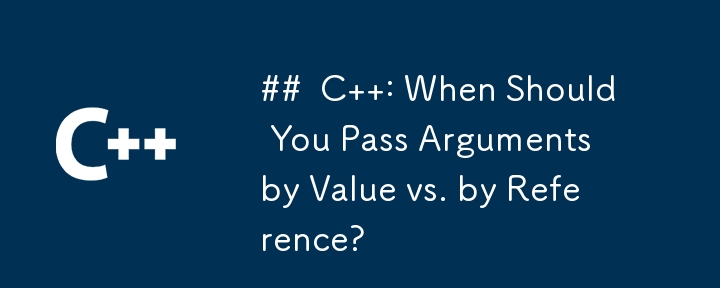

C : The Difference Between Argument Passing "By Value" and "By Reference"
In C , the interaction between a parameter and its argument is determined by the type of the parameter. While value passing is typical, reference passing offers distinct advantages in certain scenarios.
Reasoning Behind Reference Passing
Reference passing serves two primary purposes:
Example: Modifying Argument Value
Consider the following function:
<code class="cpp">void get5and6(int *f, int *s)
{
*f = 5;
*s = 6;
}</code>Here, pointers are used to pass arguments by reference. By calling the function with:
<code class="cpp">int f = 0, s = 0; get5and6(&f, &s);</code>
f and s will be set to 5 and 6, respectively, because the function modifies the values pointed to by the references.
Alternatively, using references directly yields the same result:
<code class="cpp">void get5and6(int &f, int &s)
{
f = 5;
s = 6;
}</code>Calling the function with:
<code class="cpp">int f = 0, s = 0; get5and6(f, s);</code>
produces the same effect.
Example: Performance Optimization
Consider a function that saves game state:
<code class="cpp">void SaveGame(GameState& gameState)
{
gameState.update();
gameState.saveToFile("save.sav");
}</code>Without reference passing, a copy of the GameState object would be created inside the function, potentially consuming significant resources. By passing by reference, only the address of the object is copied, avoiding the overhead of copying its large contents.
When to Use References
Reference passing is advantageous when:
Const References
Const references ensure that the argument cannot be modified within the function. They are used to enforce read-only access to certain parameters.
The above is the detailed content of ## C : When Should You Pass Arguments by Value vs. by Reference?. For more information, please follow other related articles on the PHP Chinese website!




